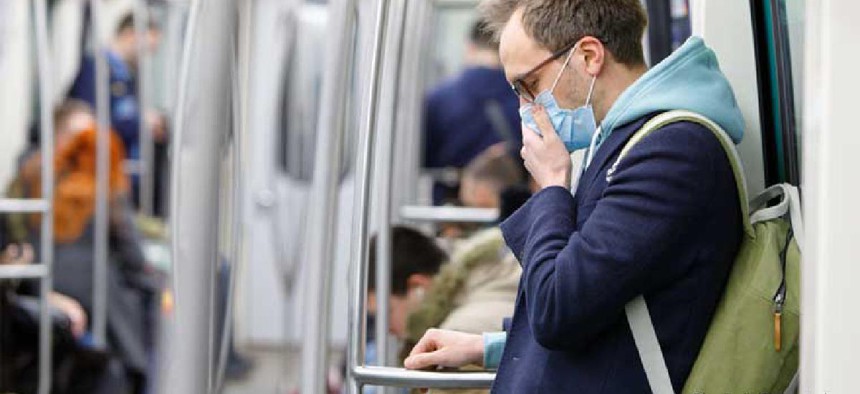Connecting state and local government leaders
Researchers, industry and governments across the world are developing apps that track possible transmission of the coronavirus based on location data from smartphones.
Researchers, industry and governments across the globe are partnering to develop apps that track possible transmission of the coronavirus based on location data from smartphones.
On Feb. 11, China launched the Hangzhou Health Code app that assigns a green, orange or red QR code to users based on their health status. After users answer questions related to their recent travel and contacts, the system combines that information with background data from government systems and determines which color code a user is assigned. That code tells users if they have come into contact with someone who might have the virus and dictates whether users should be out in public, at home for seven days or under a two-week quarantine, which requires the patient to regularly check in with health authorities via DingTalk, a workplace chat app run by Alibaba.
The health database is closely monitored by Hangzhou’s Center for Disease Control and Prevention, according to the World Economic Forum.
The phone-based app displays the code, which must be scanned by users entering public spaces, large buildings, shopping areas, buses or trains and at health checkpoints. The color will likely change if users’ close contacts become infected or recover from the illness.
That status makes it possible for the “close contact detector” app to alert other residents if they’ve been seated near a possibly contagious person on a train or plane and to identify the homes of persons known to be infected. Those who have been in close contact with the virus-positive are advised to stay at home and get in touch with local health authorities. The app also lets users check the health status of three others by entering their ID numbers.
The app was developed by the General Office of the State Council, the National Health Commission and Alibaba Group Holding Ltd and Tencent Holdings Ltd., and has received support from other government agencies that help ensure the app is based on “accurate, reliable and authoritative data,” according to the state-run news agency Xinhua.
The app pulls data not just from government database, but also from advanced monitoring systems that use surveillance cameras and artificial intelligence to scan the streets for people with fevers, recognize their faces even if they are wearing masks and report them to the authorities, according to a Reuters report. It also relies on proximity sensing between phones, GPS data and the QR code scans at public places.
A QR-code based tracking app was also developed by WeChat.
The South Korean government deployed a similar app called the self-quarantine safety protection service. It uses GPS to track infected persons to make sure they keep themselves isolated and allows patients to stay in contact with case workers who report on their progress.
“People can wander out of their quarantine areas intentionally as well as by mistake,” Jung Chang-hyun, the official who supervised development of the app by the Ministry of the Interior and Safety, told MIT Technology Review. “But because there is a risk of secondary infection either way, we hope that the app can help block these unnecessary incidents in a more organized way.”
The Hong Kong government is issuing arriving passengers with electronic wristbands that connect to an app that monitors their movements while under a new 14-day compulsory quarantine designed to limit the spread of the virus. One user told CNBC that he was instructed “to walk around the corners of his house, upon arriving home, so the technology could precisely track the coordinates of his living space in which he would remain under quarantine.”
Officials in the U.K. are working on an app much like those used in China and Korea, but which better conforms to Western notions of transparency and data privacy. It acts as a portal for COVID-19 health services, information and instructions, allows symptomatic users to request a test and can be used to order food deliveries during self-isolation.
Additionally, it tracks contacts of people voluntarily using the app via GPS. People who tested positive for the virus are added to the system by the National Health Service, and other app users would be alerted when they came within a certain radius of an infected person.
The effectiveness of the app depends on widespread use, and “will only be achievable if it is capable of commanding well-founded public trust and confidence,” the researchers wrote in their paper. However, the “algorithmic approach we propose avoids the need for coercive surveillance, since the system can have very large impacts and achieve complete herd protection, even with partial uptake,” they said.
Israel, meanwhile, has just launched a tracking app call Track Virus, which cross-checks users’ movements and alerts them if they have come in contact with an infected person whose itineraries are later shared by the Health Ministry. It cannot therefore cover the movements of users or patients that had occurred before the app had been installed.
“As the number of coronavirus patients rises, it becomes harder for the public to keep track of all the different places that they have all been along with the updates from the Health Ministry,” Dov Maisel, United Hatzalah vice president of operations, told the Jerusalem Post. “Additionally, people often have a hard time recalling exactly where they have been and when. The app solves both of these problems.”
In the U.S., concerns about government surveillance and data privacy so far have kept such tracking apps from widespread use, but researchers at MIT may have found a palatable solution.
Private Kit: Safe Paths, a free open-source smartphone app developed by researchers at the MIT Media Lab and Harvard, along with software engineers from Facebook and Uber, tracks where users have been and whom they have come in contact with. It then shares encrypted location data between users’ phones so they can see if they may have come in contact with someone carrying the virus – provided that person is also using the app -- without revealing who the person was and without passing the data through a central authority. A virus-positive user can also share location data with health officials, who can then close off specific areas for disinfecting, according to a report in MIT Technology Review.
Researchers warned, however, that the app’s ability to pinpoint infection locations depends on many people using the app and that incomplete information could lead to people thinking an area is safe when it’s not.




